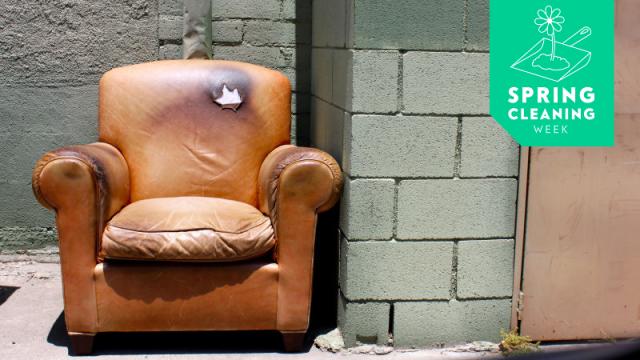Decluttering old or useless junk might make you feel jubilant and free, but not everyone shares that mindset. Whether it’s a ratty old recliner your spouse won’t give up, an overabundance of cookware in the kitchen, or a collection of weird posters your roommate hung in your living room, there are ways to compromise when it’s time for a thorough spring cleaning.
First, Set an Example
Before you say anything to your cohabitant about their stuff, you need to do some decluttering of your own things. After all, how can you expect someone to agree to tossing things out if you’re not willing to do the same. They need to see that you’re open to getting rid of things too, otherwise they will think your mission is to only get rid of their stuff. It will feel like a personal attack, instead of a joint effort to tidy up the place.
Focus On One Thing at a Time
When you’ve got their attention, find one thing that drives you crazy and open up a dialogue about it. If possible, it’s best to start with smaller, less-sentimental items, then work your way up over time. That way you’re planting seeds for a decluttering mindset. They need to learn slowly and gradually that it’s not the end of the world when something goes away.
Get Their Perspective, Then Share Yours
Ask them questions about the item, but do not ridicule them in any way about it. Again, this needs to be a positive, open discussion about the thing. Here are some question examples:
- Why do you feel like you need to keep this?
- What’s your goal for this?
- When was the last time you used/looked at this?
- Is there someone else that might get more use out of this?
After you’ve got a better understanding of how they feel about the item, you can explain your perspective. Tell them what bothers you about keeping it around. Don’t just say, “I hate it.” Give them a good reason why the item makes you feel negatively.
The key to this working is that no one is perceived as the “bad guy” in the situation. It’s not you making them get rid of something, and it’s not them refusing to get rid of something. It’s two people with differing opinions on whether an item is right for the home. Make that clear.
Be Ready to Compromise
At this point, they may fold and agree to get rid of the item if they’re not attached to it. But don’t hold your breath. Be ready to make a deal with them. Maybe they can keep that particular item if you’re allowed to get rid of another. Or perhaps they will agree to find a better place for it where it doesn’t bother you as much (like some kind of storage). Or, if an item is just old and ragged, you can offer to help replace it with something newer and less gross. It may not be easy to find the right deal for your situation, but there are a few options you can try.
Try the Box Trick
There’s a classic decluttering trick where you gather items you’re not sure you should keep, then place them in a box out of sight. After a certain amount of time — usually a few months to a year — whatever you didn’t need during that period of time you get rid of.
Suggest this method for items you want your cohabitant to toss. Put some of your own clutter in the box, then ask them to stick their items in. Take the box to the garage, attic, closet, or other out of the way area in the home and let time pass. This works for two reasons: they finally realise they don’t need the items that get stowed away in the box, and they have time to see how much cleaner and more organised the home is with those things out of the way.
Offer to Donate or Sell the Item for Them
It’s possible your partner or roommate is waste averse and simply keeps things because they think they’re still useful or valuable — and they might be right. You can appeal to their thriftiness by offering to donate or sell the items yourself. This helps you get the clutter out of the house, and they can rest easy knowing that someone will still get use out of the items. And if you manage to sell their stuff, they will appreciate the extra money in their pocket. This trick also works wonders when the person is lazy and just doesn’t want to deal with the process of getting rid of stuff.
Set Some Agreed Upon Ground Rules
In the future, you can prevent a lot of this hassle by setting ground rules for parts of your home after a big clean. Start by setting space limits to keep drawers, bookshelves, and other repositories from overflowing, and designate communal areas and personal areas. In communal areas, all parties have to agree on the items there. You can emphasise the fact that these areas will be easier to clean if there’s less clutter. In personal areas, individuals can keep whatever they want in there, within reason. It’s their job to clean that area, and you never have to set foot in there.

Comments